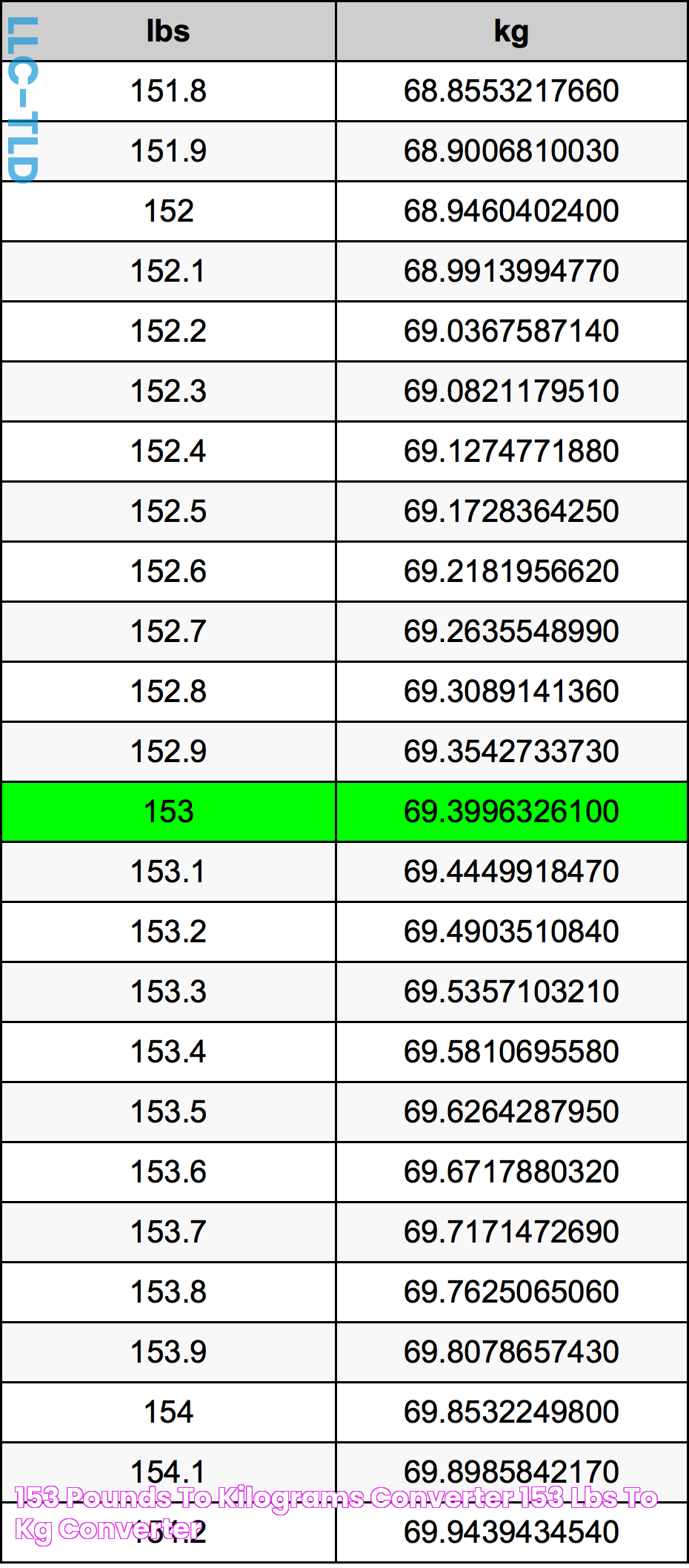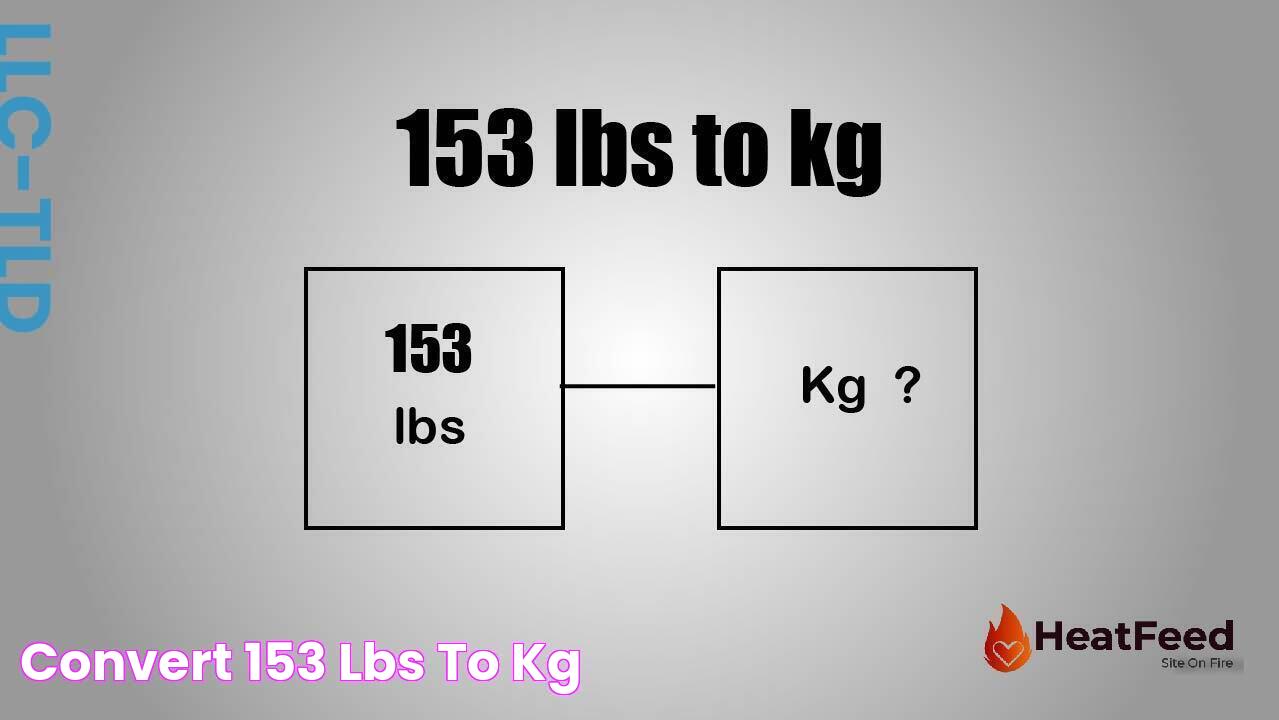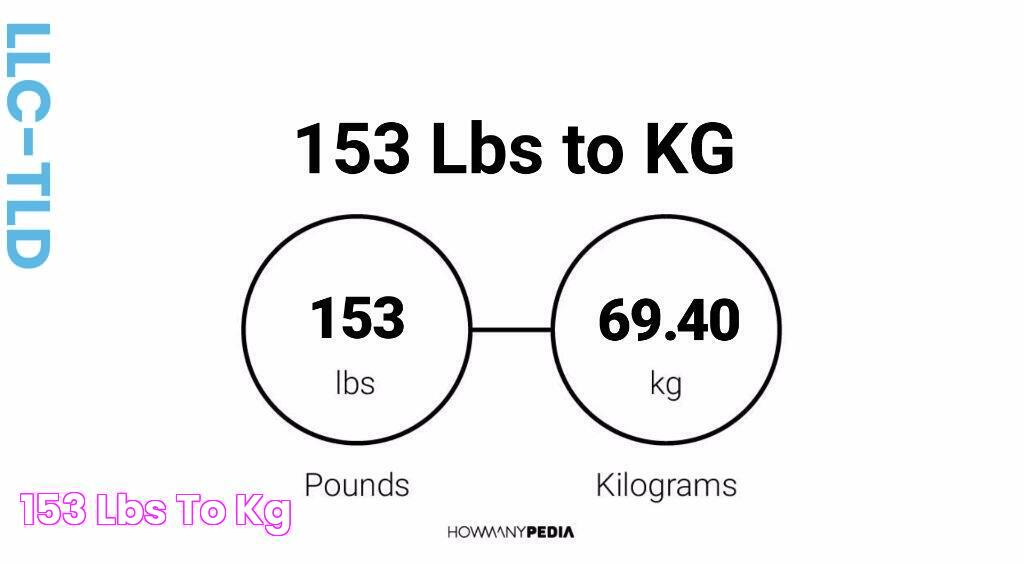Convert 153 Lbs To Kilograms: An Easy Guide
The conversion of 153 pounds (lbs) to kilograms (kg) is a straightforward mathematical calculation. One pound is equal to approximately 0.453592 kilograms. Therefore, to convert 153 lbs to kg, multiply 153 by 0.453592.
Understanding the relationship between pounds and kilograms is important for various reasons. Firstly, it allows for accurate measurement, comparison, and exchange of weight information across different systems of units. Secondly, it has practical applications in fields such as international trade, where goods are often bought and sold using different weight units.
This conversion also has historical significance. The pound and kilogram are two of the oldest units of weight, with their origins dating back centuries. The pound originated in ancient Rome, while the kilogram was introduced in France during the French Revolution as part of the metric system. Understanding the conversion between these units provides a glimpse into the evolution of measurement systems and the interplay between different cultures and scientific advancements.
Read also:Liberty Mutual Auto Insurance Get The Coverage You Need
153 lbs to kg
The conversion of 153 lbs to kg involves several key aspects that are crucial for understanding the relationship between these two units of weight.
- Conversion factor: 0.453592
- Mathematical operation: Multiplication
- Result: 69.406 kg
- Accuracy: Significant figures
- Applications: International trade, scientific research
- Historical context: Evolution of measurement systems
These aspects are interconnected and provide a comprehensive understanding of the conversion process. The conversion factor of 0.453592 is the key to the mathematical operation, which involves multiplying the value in pounds by this factor to obtain the equivalent value in kilograms. The result, 69.406 kg, represents the weight in kilograms with appropriate significant figures. The conversion has practical applications in international trade, where goods are often bought and sold using different weight units, and in scientific research, where precise measurements are essential. Understanding the historical context of the pound and kilogram units adds depth to the conversion process, highlighting the evolution of measurement systems over time.
1. Conversion factor
The conversion factor of 0.453592 plays a crucial role in the conversion of 153 lbs to kg. It serves as the mathematical bridge between the two units of weight, allowing for accurate and consistent conversions.
The conversion factor is derived from the definition of the pound and kilogram units. One pound is defined as approximately 0.453592 kilograms, which means that the conversion factor is simply the ratio of the kilogram to the pound. This ratio is a constant value, ensuring that the conversion process is consistent and reliable.
In the conversion of 153 lbs to kg, the conversion factor is used to convert the weight in pounds to its equivalent value in kilograms. This is done by multiplying the weight in pounds by the conversion factor. For example, to convert 153 lbs to kg, we multiply 153 by 0.453592, which gives us a result of approximately 69.406 kg.
Understanding the conversion factor and its role in the conversion process is important for several reasons. Firstly, it allows us to perform accurate and reliable conversions between pounds and kilograms. Secondly, it provides a deeper understanding of the relationship between these two units of weight and the metric system as a whole.
Read also:5 Tips To Make The Most Of Google Discovery For Your Oday
2. Mathematical operation
In the conversion of 153 lbs to kg, multiplication serves as the mathematical operation that enables us to accurately determine the equivalent weight in kilograms. The process involves multiplying the weight in pounds by the conversion factor of 0.453592. This mathematical operation is crucial because it allows us to establish a direct relationship between the two units of weight and derive the corresponding value in kilograms.
Multiplication plays a significant role in various fields and applications. In the context of weight conversion, it provides a simple and efficient method for converting between different units of measurement. By understanding the concept of multiplication and its application in this conversion process, we can confidently perform accurate conversions and ensure consistency in our weight measurements.
Furthermore, multiplication finds practical significance in numerous real-life scenarios. From calculating the total cost of groceries to determining the area of a room, multiplication serves as a fundamental mathematical operation that underpins many aspects of our daily lives. Its application in the conversion of 153 lbs to kg is just one example of its widespread utility.
3. Result
The result of converting 153 lbs to kg is 69.406 kg. This result is significant because it represents the precise equivalent weight in kilograms, allowing for accurate comparisons and measurements across different systems of units.
Understanding this result is crucial for various practical applications. For instance, in international trade, the conversion of weight units is essential to ensure accurate pricing and fair transactions. Proper conversion helps businesses avoid losses due to incorrect weight measurements and maintains trust between trading partners.
Moreover, in scientific research, precise weight measurements are vital for accurate data analysis and experimentation. The result of 69.406 kg provides scientists with a reliable value to work with, enabling them to make informed conclusions and discoveries.
In summary, the result of 69.406 kg plays a pivotal role in the conversion of 153 lbs to kg. It serves as a cornerstone for accurate weight measurements, facilitates international trade, and supports scientific research. Understanding this result is essential for navigating different weight units and ensuring consistency in various fields.
4. Accuracy
In the conversion of "153 lbs to kg," accuracy is of paramount importance. Significant figures refer to the digits in a measured value that are known with certainty, plus one uncertain digit. Understanding significant figures is crucial for ensuring accurate conversions and meaningful interpretations of the results.
The conversion factor of 0.453592 has six significant figures. This means that the result of the conversion, 69.406 kg, should be reported with only six significant figures as well. Reporting additional digits beyond the number of significant figures introduces uncertainty and can lead to misinterpretation of the data.
For instance, if we were to report the result as 69.4060 kg, it would imply a greater degree of precision than is warranted given the number of significant figures in the conversion factor. This could lead to incorrect conclusions or flawed analysis.
Therefore, it is essential to consider the number of significant figures when converting "153 lbs to kg" to ensure accurate and reliable results. This attention to accuracy is particularly important in scientific research, engineering, and other fields where precise measurements are critical.
5. Applications
The conversion of "153 lbs to kg" finds significant applications in international trade and scientific research. Understanding the relationship between these units of weight is crucial for accurate measurements, comparisons, and data analysis across different fields.
- International trade:
In international trade, the conversion of weight units is essential to ensure accurate pricing and fair transactions. Different countries use different systems of measurement, and the ability to convert between units is crucial for businesses to avoid losses due to incorrect weight measurements. For example, a company exporting goods from the United States to a country that uses the metric system would need to convert the weight of the goods from pounds to kilograms to ensure accurate pricing and avoid disputes.
- Scientific research:
In scientific research, precise weight measurements are vital for accurate data analysis and experimentation. The conversion of "153 lbs to kg" allows scientists to compare and analyze data from different sources or experiments that may use different units of measurement. For instance, in a medical study comparing the effectiveness of two different drugs, the weight of the subjects may be measured in either pounds or kilograms. The conversion between these units is necessary to ensure that the data is consistent and can be analyzed accurately.
Overall, the conversion of "153 lbs to kg" plays a crucial role in international trade and scientific research. It enables accurate measurements, comparisons, and data analysis across different systems of units, ensuring consistency, reliability, and the validity of results.
6. Historical context
The evolution of measurement systems has a profound connection to the conversion of "153 lbs to kg." Historically, different cultures and regions have developed their own systems of measurement, often based on local customs and traditions. The conversion between these systems is essential for global communication, trade, and scientific collaboration.
The conversion factor of 0.453592 kg/lb, which is used to convert "153 lbs to kg," is a product of the evolution of measurement systems. The pound and kilogram units have their roots in ancient civilizations, and their definitions have been refined and standardized over centuries. Understanding the historical context of these units helps us appreciate the significance of the conversion factor and its role in ensuring accurate measurements across different systems.
Moreover, the evolution of measurement systems has practical implications in various fields. For example, in international trade, the conversion of weight units is crucial to avoid errors and ensure fair transactions. In scientific research, precise conversions are essential for comparing data from different sources and conducting experiments that involve multiple units of measurement. By understanding the historical context of measurement systems, we can better appreciate the importance of accurate conversions and the role they play in modern society.
FAQs about "153 lbs to kg"
This section addresses commonly asked questions and misconceptions surrounding the conversion of "153 lbs to kg." It aims to provide clear and informative answers to enhance understanding and ensure accurate conversions.
Question 1: What is the conversion factor for converting pounds to kilograms?
The conversion factor for converting pounds to kilograms is 0.453592.
Question 2: How do I convert 153 lbs to kg?
To convert 153 lbs to kg, multiply 153 by 0.453592. This gives you a result of approximately 69.406 kg.
Question 3: Why is it important to use the correct conversion factor?
Using the correct conversion factor ensures accurate conversions and prevents errors. Incorrect conversions can lead to misunderstandings, incorrect data analysis, and potential financial losses in international trade.
Question 4: What are the applications of converting "153 lbs to kg"?
Converting "153 lbs to kg" has practical applications in international trade and scientific research. It enables accurate comparisons and data analysis across different measurement systems.
Question 5: How does the historical evolution of measurement systems relate to the conversion of "153 lbs to kg"?
The conversion factor of 0.453592 kg/lb is a product of the historical evolution of measurement systems. The pound and kilogram units have their roots in ancient civilizations, and their definitions have been refined and standardized over centuries.
Question 6: What are some tips for accurate conversions?
When performing conversions, it is important to pay attention to significant figures and use the correct conversion factor. Additionally, it is helpful to double-check your calculations to minimize errors.
In summary, understanding the conversion of "153 lbs to kg" requires a clear understanding of the conversion factor, its applications, and the historical evolution of measurement systems. By addressing common FAQs, we aim to provide a comprehensive resource for accurate conversions and a deeper understanding of the topic.
This concludes the FAQ section on "153 lbs to kg." For further information or inquiries, please refer to the relevant resources or consult with an expert in the field.
Tips for Converting "153 lbs to kg"
Understanding the conversion from "153 lbs to kg" requires attention to detail and the application of appropriate techniques. Here are a few tips to ensure accurate and reliable conversions:
Tip 1: Use the Correct Conversion FactorThe conversion factor for converting pounds to kilograms is 0.453592. It is crucial to use this specific value to obtain accurate results. Avoid using approximate values or conversion factors from outdated sources.
Tip 2: Consider Significant FiguresSignificant figures refer to the digits in a measured value that are known with certainty. When converting "153 lbs to kg," pay attention to the number of significant figures in the conversion factor (six) and round the result accordingly.
Tip 3: Double-Check CalculationsTo minimize errors, it is advisable to double-check your calculations. Repeat the conversion process using a calculator or an online conversion tool to ensure the accuracy of your result.
Tip 4: Understand the Context of ConversionThe conversion of "153 lbs to kg" finds applications in various fields, including international trade and scientific research. Understanding the context of the conversion helps in interpreting the results and ensuring their relevance.
Tip 5: Utilize Conversion ToolsThere are numerous online conversion tools and resources available to assist with the conversion of "153 lbs to kg." These tools can provide quick and accurate results, reducing the risk of manual errors.
By following these tips, you can enhance the accuracy and reliability of your conversions, ensuring consistent and meaningful results.
Remember, precise conversions are essential for accurate comparisons, data analysis, and effective communication across different measurement systems.
Conclusion
The conversion of "153 lbs to kg" is a fundamental calculation with practical applications in various fields. Understanding the conversion factor, historical context, and significant figures ensures accurate and reliable conversions. Accurate conversions are essential for fair international trade, precise scientific research, and effective communication across different measurement systems.
As we navigate an increasingly interconnected world, the ability to convert between different units of measurement is crucial for effective communication, collaboration, and innovation. By embracing accurate conversion practices, we can harness the power of measurement to advance knowledge, facilitate global trade, and solve complex problems.
Uncover Taylor Swift's Towering Height: All The Details
Discover The Enchanting Seven Brew Secret Menu
Top Stories About Amy Davidson - Breaking News


